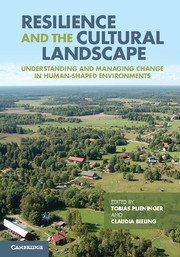 Resilience and the Cultural Landscape
Resilience and the Cultural Landscape Book contents
- Frontmatter
- Contents
- List of contributors
- Preface
- Part I Conceptualising landscapes as social–ecological systems
- 1 Connecting cultural landscapes to resilience
- 2 Landscapes as integrating frameworks for human, environmental and policy processes
- 3 From cultural landscapes to resilient social–ecological systems: transformation of a classical paradigm or a novel approach?
- 4 Conceptualising the human in cultural landscapes and resilience thinking
- 5 System or arena? Conceptual concerns around the analysis of landscape dynamics
- 6 Resilience thinking versus political ecology: understanding the dynamics of small-scale, labour-intensive farming landscapes
- Part II Analysing landscape resilience
- Part III Managing landscapes for resilience
- Part IV Perspectives for resilient landscapes
- Index
- References
6 - Resilience thinking versus political ecology: understanding the dynamics of small-scale, labour-intensive farming landscapes
Published online by Cambridge University Press: 05 November 2012
- Frontmatter
- Contents
- List of contributors
- Preface
- Part I Conceptualising landscapes as social–ecological systems
- 1 Connecting cultural landscapes to resilience
- 2 Landscapes as integrating frameworks for human, environmental and policy processes
- 3 From cultural landscapes to resilient social–ecological systems: transformation of a classical paradigm or a novel approach?
- 4 Conceptualising the human in cultural landscapes and resilience thinking
- 5 System or arena? Conceptual concerns around the analysis of landscape dynamics
- 6 Resilience thinking versus political ecology: understanding the dynamics of small-scale, labour-intensive farming landscapes
- Part II Analysing landscape resilience
- Part III Managing landscapes for resilience
- Part IV Perspectives for resilient landscapes
- Index
- References
Summary
The problem
Europe is experiencing changes in agricultural landscapes. We are rapidly losing landscapes characterised by continuous human care and labour, high diversity in land use and, as consequence of that, a high biodiversity. Such landscapes are abandoned and replaced by urban development, forestry or large monotonous agricultural fields. At the same time, as a result of these changes, we are witnessing a growing awareness of the idea that the landscape is a common good, a good that public funds should be used to manage and sustain. Landscape has thus become a policy arena in Europe today. Landscape researchers are involved in applied research to a much greater extent than before. We are expected to assess the value of different landscapes, to give advice on how to preserve and manage landscapes and to contribute to landscape policies at regional, national and European levels.
For that we need good theories and good explanatory frameworks. Many would perhaps argue that, in this moment of rapid landscape change in Europe, we should put theoretical disagreements aside and, instead, focus on raising awareness and finding methods to preserve the few remains of such small-scale farming landscapes that we still have. I am of the opposite opinion: increased demand for applied research puts the theoretical and explanatory frameworks on centre stage. If we do not have sharp tools, theories and methods, our understanding of the cultural landscape will be shallow and our advice to policy makers most uncertain (Widgren, 2012). We need good theories that can explain the emergence, persistence and decline of particular types of farming systems and their accompanying landscapes.
- Type
- Chapter
- Information
- Resilience and the Cultural LandscapeUnderstanding and Managing Change in Human-Shaped Environments, pp. 95 - 110Publisher: Cambridge University PressPrint publication year: 2012
References
- 11
- Cited by


